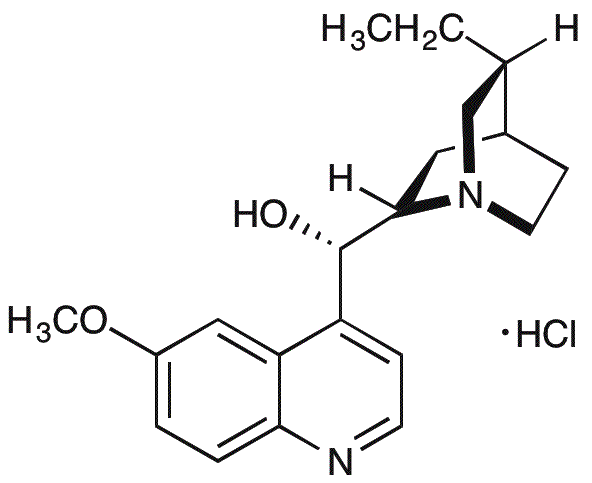Hydroquinidine hydrochloride is widely utilized in research focused on:
- Cardiovascular Medicine: This compound is primarily used in the treatment of arrhythmias, helping to restore normal heart rhythm in patients. Its effectiveness in managing heart conditions makes it a crucial component in cardiology.
- Pharmaceutical Development: Researchers leverage hydroquinidine hydrochloride in drug formulation studies, particularly in developing antiarrhythmic medications. Its properties help in understanding drug interactions and efficacy.
- Clinical Trials: The compound is often involved in clinical trials aimed at evaluating new treatments for heart diseases, providing valuable data on safety and effectiveness for regulatory approvals.
- Analytical Chemistry: In laboratories, hydroquinidine hydrochloride is used as a standard reference in analytical methods, such as HPLC (High-Performance Liquid Chromatography), to ensure accurate measurement of similar compounds.
- Research on Drug Resistance: It plays a role in studies investigating drug resistance in cardiac treatments, helping researchers develop strategies to overcome challenges in patient care.
General Information
Properties
Safety and Regulations
Applications
Hydroquinidine hydrochloride is widely utilized in research focused on:
- Cardiovascular Medicine: This compound is primarily used in the treatment of arrhythmias, helping to restore normal heart rhythm in patients. Its effectiveness in managing heart conditions makes it a crucial component in cardiology.
- Pharmaceutical Development: Researchers leverage hydroquinidine hydrochloride in drug formulation studies, particularly in developing antiarrhythmic medications. Its properties help in understanding drug interactions and efficacy.
- Clinical Trials: The compound is often involved in clinical trials aimed at evaluating new treatments for heart diseases, providing valuable data on safety and effectiveness for regulatory approvals.
- Analytical Chemistry: In laboratories, hydroquinidine hydrochloride is used as a standard reference in analytical methods, such as HPLC (High-Performance Liquid Chromatography), to ensure accurate measurement of similar compounds.
- Research on Drug Resistance: It plays a role in studies investigating drug resistance in cardiac treatments, helping researchers develop strategies to overcome challenges in patient care.
Documents
Safety Data Sheets (SDS)
The SDS provides comprehensive safety information on handling, storage, and disposal of the product.
Product Specification (PS)
The PS provides a comprehensive breakdown of the product’s properties, including chemical composition, physical state, purity, and storage requirements. It also details acceptable quality ranges and the product's intended applications.
Certificates of Analysis (COA)
Search for Certificates of Analysis (COA) by entering the products Lot Number. Lot and Batch Numbers can be found on a product’s label following the words ‘Lot’ or ‘Batch’.
Numéro de catalogue
Numéro de lot/série
Certificates Of Origin (COO)
This COO confirms the country where the product was manufactured, and also details the materials and components used in it and whether it is derived from natural, synthetic, or other specific sources. This certificate may be required for customs, trade, and regulatory compliance.
Numéro de catalogue
Numéro de lot/série
Safety Data Sheets (SDS)
The SDS provides comprehensive safety information on handling, storage, and disposal of the product.
DownloadProduct Specification (PS)
The PS provides a comprehensive breakdown of the product’s properties, including chemical composition, physical state, purity, and storage requirements. It also details acceptable quality ranges and the product's intended applications.
DownloadCertificates of Analysis (COA)
Search for Certificates of Analysis (COA) by entering the products Lot Number. Lot and Batch Numbers can be found on a product’s label following the words ‘Lot’ or ‘Batch’.
Numéro de catalogue
Numéro de lot/série
Certificates Of Origin (COO)
This COO confirms the country where the product was manufactured, and also details the materials and components used in it and whether it is derived from natural, synthetic, or other specific sources. This certificate may be required for customs, trade, and regulatory compliance.


